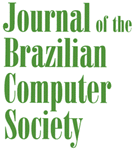Open Access
Journal of the Brazilian Computer Society
Publicação de: Sociedade Brasileira de Computação
Área:
Ciências Exatas E Da Terra
Versão impressa ISSN:
0104-6500
Versão on-line ISSN: 1678-4804 Título anterior: RBC: Revista Brasileira de Computação
